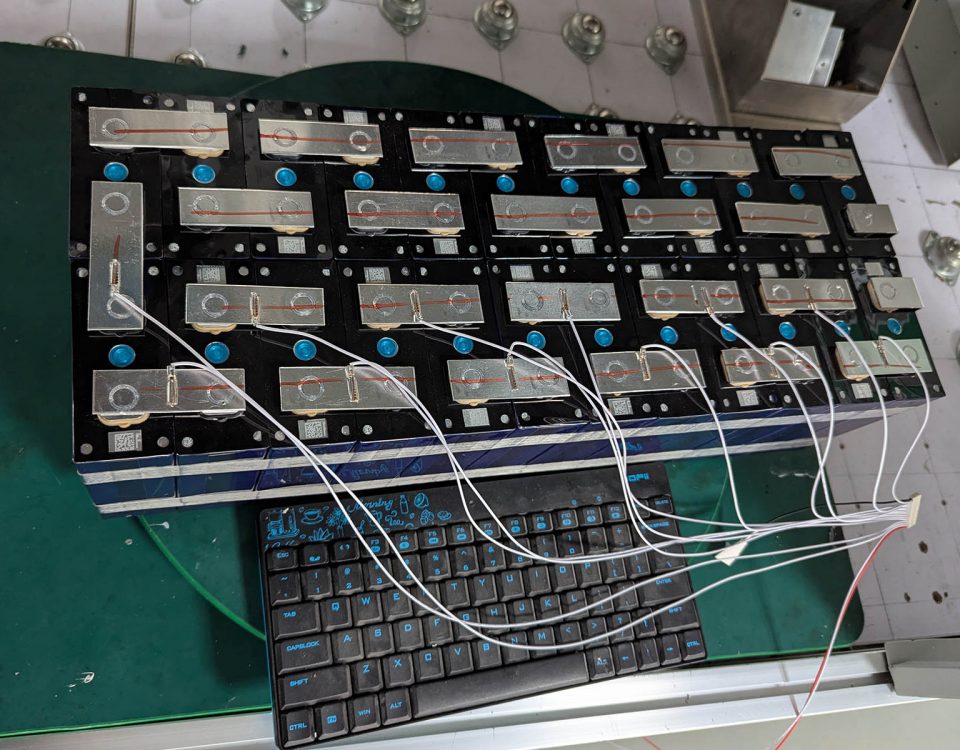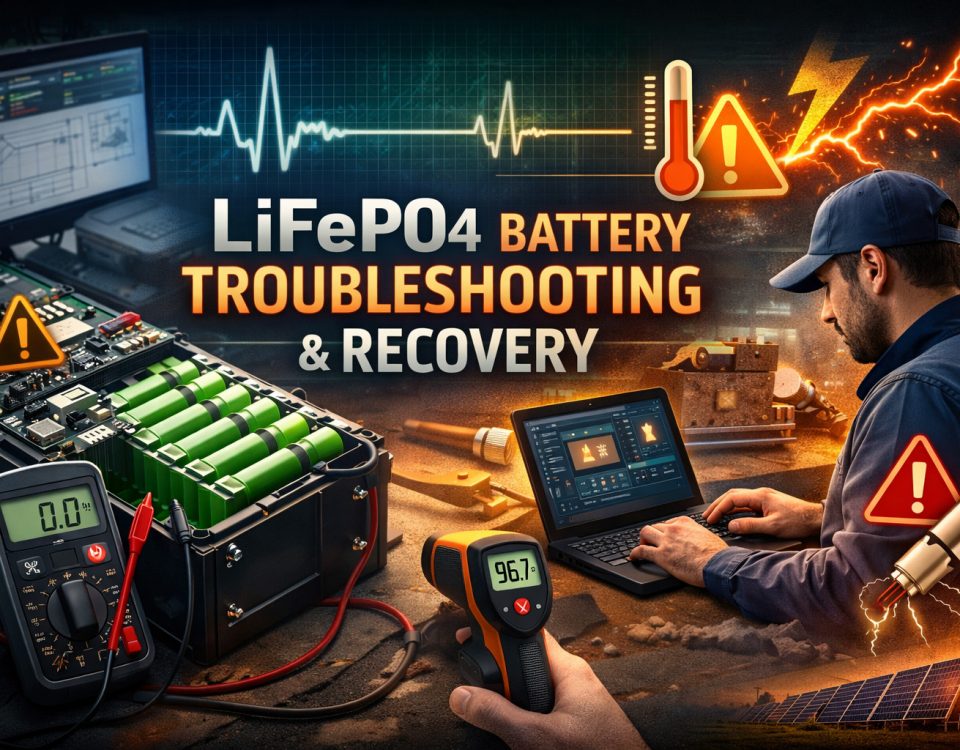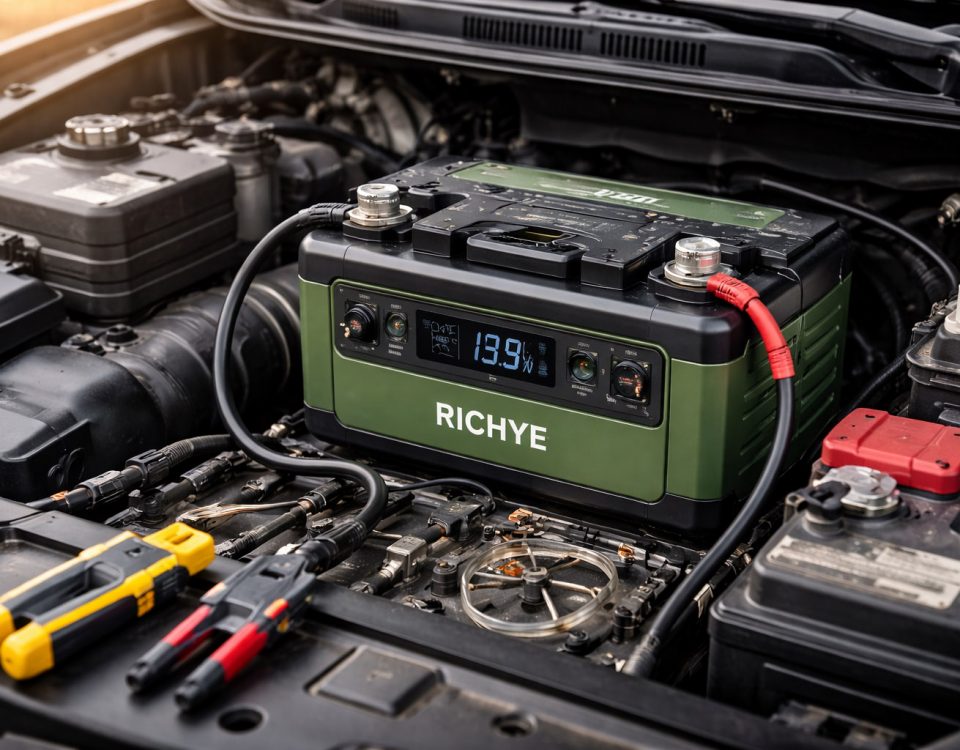Giới thiệu: Cách mạng hóa lưu trữ năng lượng
Pin lithium đã lâu nay luôn là nền tảng của thời hiện đại Lưu trữ năng lượng, cung cấp năng lượng cho mọi thứ từ điện thoại thông minh đến xe điện (EV). Tuy nhiên, khi nhu cầu về mật độ năng lượng cao hơn, sạc nhanh hơn và tuổi thọ dài hơn tiếp tục gia tăng, những hạn chế của công nghệ lithium-ion truyền thống đã trở nên rõ ràng. Hai đột phá công nghệ mới xuất hiện: pin trạng thái rắn và điện cực silicon. Những tiến bộ này hứa hẹn sẽ thay đổi diện mạo của ngành lưu trữ năng lượng, mở ra một kỷ nguyên mới về hiệu quả, an toàn và bền vững.
Bài viết này đi sâu vào cơ sở khoa học của các công nghệ này, tác động tiềm năng của chúng và tương lai của pin lithium.
Pin trạng thái rắn: Bước đột phá về an toàn và hiệu quả
Pin trạng thái rắn là gì?
Khác với pin lithium-ion truyền thống, sử dụng điện giải lỏng để thúc đẩy quá trình chuyển ion, pin trạng thái rắn sử dụng điện giải rắn. Sự thay đổi tưởng chừng đơn giản này mang lại nhiều lợi ích đột phá:
- An toàn được nâng cao: Chất điện phân rắn không cháy, giúp giảm đáng kể nguy cơ cháy nổ và hiện tượng quá nhiệt.
- Độ dày năng lượng cao hơn: Các thiết kế trạng thái rắn cho phép sử dụng các vật liệu có dung lượng cao như lithium kim loại, có thể tăng gấp đôi dung lượng lưu trữ năng lượng.
- Tuổi thọ dài hơn: Giảm thiểu sự suy giảm của vật liệu pin giúp kéo dài tuổi thọ chu kỳ, khiến các loại pin này trở nên lý tưởng cho các ứng dụng lâu dài như xe điện (EV) và lưu trữ năng lượng lưới.
Những thách thức cần vượt qua
Mặc dù có tiềm năng, pin trạng thái rắn vẫn gặp phải những thách thức về khả năng mở rộng quy mô và chi phí. Việc sản xuất điện giải rắn và đảm bảo tương thích với điện cực lithium kim loại vẫn là những thách thức kỹ thuật. Tuy nhiên, những tiến bộ trong khoa học vật liệu và các phương pháp sản xuất sáng tạo đang nhanh chóng thu hẹp những khoảng cách này.
Điện cực silic: Mở khóa dung lượng lớn hơn
Vai trò của silic trong pin lithium
Các điện cực silicon đại diện cho một bước đột phá mới trong công nghệ pin lithium. Silicon có khả năng lưu trữ lượng ion lithium lớn hơn đáng kể so với các điện cực graphite truyền thống, có thể tăng mật độ năng lượng lên đến 10 lần. Điều này có thể dẫn đến việc sản xuất các pin nhỏ gọn hơn, nhẹ hơn và có thời lượng sử dụng lâu hơn—một bước ngoặt quan trọng cho cả thiết bị điện tử di động và xe điện (EV).
Vượt qua vấn đề mở rộng
Một trong những thách thức chính của điện cực silicon là xu hướng giãn nở và co lại trong quá trình sạc, dẫn đến sự suy giảm vật liệu. Các nhà nghiên cứu đang giải quyết vấn đề này bằng cách phát triển vật liệu composite, cấu trúc silicon nano và các chất kết dính tiên tiến giúp giảm thiểu sự giãn nở đồng thời duy trì độ dẫn điện.
Xu hướng tương lai và tích hợp
Kết hợp công nghệ tiên tiến: Công nghệ trạng thái rắn gặp công nghệ silicon
Việc tích hợp điện cực silic vào pin trạng thái rắn có thể tạo ra sự kết hợp hài hòa, tận dụng tối đa ưu điểm của cả hai công nghệ. Hãy tưởng tượng những viên pin có mật độ năng lượng, độ an toàn và độ bền vô song, có khả năng cung cấp năng lượng cho các phương tiện điện thế hệ mới và hệ thống lưới điện năng lượng tái tạo.
Vai trò của Trí tuệ nhân tạo (AI) và Internet of Things (IoT)
Trí tuệ nhân tạo (AI) và Internet of Things (IoT) sẽ đóng vai trò quan trọng trong việc tối ưu hóa hiệu suất pin. Từ bảo trì dự đoán đến quản lý năng lượng thời gian thực, các hệ thống thông minh sẽ đảm bảo rằng các pin trong tương lai hoạt động ở hiệu suất tối đa đồng thời giảm thiểu tác động đến môi trường.
Bền vững và Tái chế
Khi các loại pin tiên tiến này trở nên phổ biến, tính bền vững sẽ tiếp tục là ưu tiên hàng đầu. Phát triển các phương pháp tái chế hiệu quả cho pin trạng thái rắn và pin dựa trên silicon sẽ là yếu tố quan trọng để giảm thiểu tiêu thụ tài nguyên và tác động đến môi trường.
RICHYE: Đối tác đáng tin cậy trong lĩnh vực đổi mới pin lithium
RICHYE RICHYE là đơn vị tiên phong trong lĩnh vực sản xuất pin lithium, cung cấp các sản phẩm vượt trội về chất lượng, hiệu suất, an toàn và giá cả hợp lý. Với cam kết mạnh mẽ đối với sự đổi mới, RICHYE tiếp tục nghiên cứu và phát triển các công nghệ tiên tiến như pin trạng thái rắn và điện cực silicon, đảm bảo khách hàng của mình được trang bị các giải pháp năng lượng tốt nhất cho tương lai. Được tin cậy bởi các ngành công nghiệp trên toàn thế giới, RICHYE đang định hình lại những gì có thể đạt được trong lĩnh vực lưu trữ năng lượng.
Ứng dụng của pin lithium thế hệ mới
-
Xe điện (EV):
Pin trạng thái rắn và pin có cực dương bằng silicon có thể kéo dài đáng kể phạm vi di chuyển đồng thời giảm thời gian sạc, giải quyết hai trong số những rào cản lớn nhất đối với việc phổ cập xe điện. -
Đồ điện tử tiêu dùng:
Pin nhẹ, dung lượng cao sẽ cho phép tạo ra các thiết bị mỏng hơn và có thời lượng pin lâu hơn, từ điện thoại thông minh đến các thiết bị đeo. -
Lưu trữ năng lượng tái tạo:
Hệ thống lưu trữ quy mô lưới điện được trang bị các loại pin tiên tiến này sẽ tạo điều kiện thuận lợi cho việc tích hợp nguồn năng lượng tái tạo một cách hiệu quả hơn, mở ra con đường hướng tới một tương lai bền vững hơn. -
Hàng không vũ trụ và Quốc phòng:
Với độ an toàn và độ bền được nâng cao, pin trạng thái rắn và pin dựa trên silicon là lựa chọn lý tưởng cho các ứng dụng đòi hỏi khắt khe trong lĩnh vực hàng không vũ trụ và hoạt động quân sự.
Các yếu tố quan trọng cần xem xét khi áp dụng
-
Chi phí và tính khả dụng:
Chi phí ban đầu cho các loại pin tiên tiến này có thể cao hơn, nhưng quy mô kinh tế và nghiên cứu liên tục được kỳ vọng sẽ làm giảm giá thành theo thời gian. -
Sẵn sàng về hạ tầng:
Các ngành công nghiệp áp dụng các công nghệ này phải đảm bảo tính tương thích với các hệ thống hiện có, bao gồm mạng lưới sạc và hệ thống quản lý pin (BMS). -
Chính sách và Quy định:
Các chính phủ và cơ quan quản lý sẽ cần thiết lập các tiêu chuẩn để đảm bảo việc áp dụng an toàn và rộng rãi các công nghệ mới này.
Kết luận: Con đường phía trước
Pin trạng thái rắn và điện cực silic đại diện cho bước đột phá tiếp theo trong pin lithium Công nghệ này hứa hẹn mang lại những bước tiến vượt bậc về mật độ năng lượng, an toàn và bền vững. Khi những công nghệ này phát triển hoàn thiện, chúng sẽ thay đổi cách chúng ta cung cấp năng lượng cho các thiết bị, phương tiện giao thông và hạ tầng, tạo ra một tương lai nơi lưu trữ năng lượng an toàn hơn, hiệu quả hơn và dễ tiếp cận hơn bao giờ hết.
Đối với cả doanh nghiệp và người tiêu dùng, việc áp dụng các công nghệ này mở ra con đường hướng tới hiệu suất cao hơn và trách nhiệm môi trường. Với sự dẫn dắt của các đối tác đáng tin cậy như RICHYE, tiềm năng cho sự đổi mới là vô tận.
Đây không chỉ là tương lai của pin lithium; đó là tương lai của chính năng lượng.



